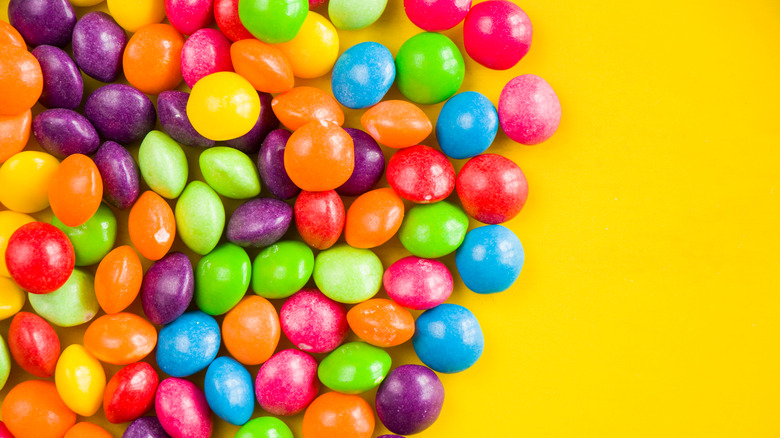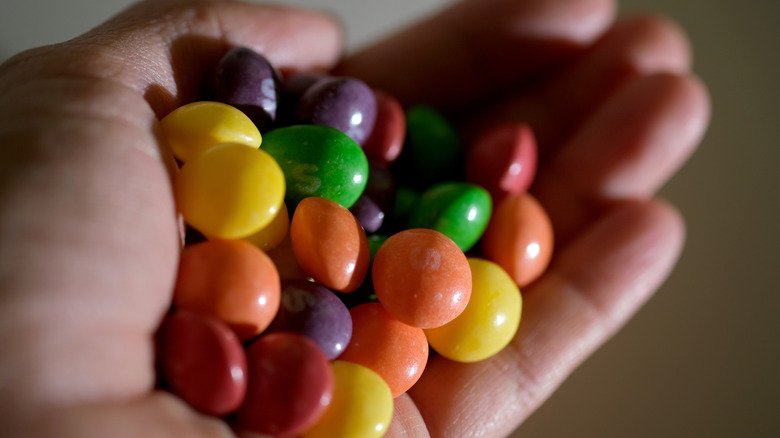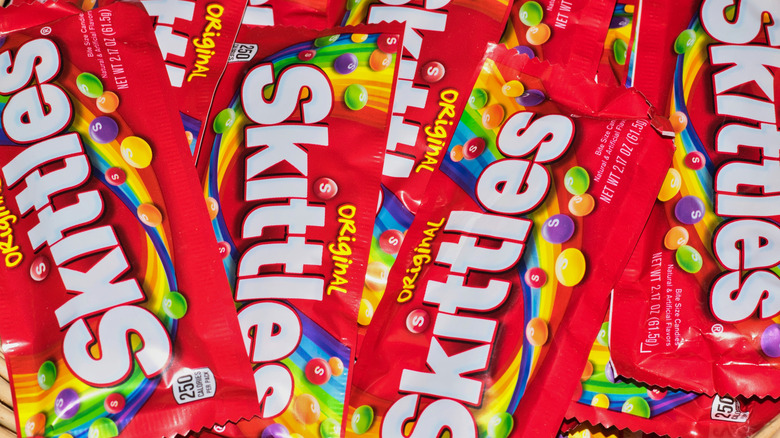Why Skittles Is Being Sued Over Its Candy Colors
There's a reason Skittles fans can "taste the rainbow." The brightly colored candy with popping different flavors is so visually stimulating thanks to one key ingredient: titanium dioxide.
According to Chemical Safety Facts, titanium is a naturally-occurring metal. In fact, it's the ninth most common element in the Earth's crust. But, the compound titanium dioxide is chemically quite different. Titanium dioxide is a white powder with bright pigmentation and high opacity, making it popular in paints, inks, cosmetics, sunscreen, and textiles, among many other products. The substance may be pretty, but the prospect of consuming it might seem alarming, at best.
Now, Mars (the candy-maker behind such internationally famous products as M&Ms, Snickers, Orbit and Extra chewing gum, and Skittles) is facing a class action lawsuit in the U.S. District Court for the Northern District of California for its use of the ingredient, which San Leandro resident Jenile Thames calls "unfit for human consumption" (via The Washington Post).
Experts raise eyebrows over titanium dioxide
Skittles faced a recall earlier this year in May, along with Starburst and Life Savers, for containing thin strips of metal (per the FDA). Yikes. While metal is definitely a culinary no-go, there's nothing illegal about using titanium dioxide as a food additive. FDA regulations allow food products to contain titanium dioxide up to 1% of the food's overall weight.
The International Agency for Research on Cancer (IARC) of the World Health Organization lists titanium dioxide as having "poorly soluble particles that are weakly toxic." As far as carcinogenicity, however, the impacts of titanium dioxide are thus far inconclusive. The Natural Library of Medicine lists titanium dioxide as "possibly carcinogenic to humans." Studies of the carcinogenicity of the substance concluded it is cancer-causing to animals, but studies of its effect on humans have provided inadequate evidence.
However, in May, the European Food Safety Authority (EFSA) reevaluated titanium dioxide and declared it no longer safe as a food additive. The ESFA deemed titanium dioxide a genotoxin: a substance that can permanently alter a person's chromosomal DNA structure, says David H. Philips of the Institute of Cancer Research, Sutton (per the National Library of Medicine). These genetic mutations, Philips explains, can result in cancer. Following the ESFA's ruling, which goes into effect in August, several European countries have already banned titanium dioxide as a food additive, via USA Today.
Mars goes back on initial commitment to food safety
The lawsuit comes after candy-giant Mars announced plans to phase out artificial colorings, via an official statement from the Center For Food Safety in October 2016 – including titanium dioxide, explicitly. In February, Mars told consumers it would be eliminating additives from its products over the next five years, but the Center for Food Safety reached out and specifically asked whether titanium dioxide would be included among the additives Mars planned to remove — which Mars confirmed. "We are pleased to see that MARS has taken a positive step toward eliminating toxic, unnecessary nanomaterials from its line of food products," Jaydee Hanson, Senior Policy Analyst at the Center for Food Safety, commented at the time. "We urge the company to speed up the removal of these additives, especially given the grave health concerns associated with titanium dioxide and other nanoparticles."
Yet, in 2022, over five years later, titanium dioxide still remains among the listed ingredients on a package of Skittles – which is exactly what the lawsuit takes issue with. "Defendant has flouted its own promise to consumers," the statement reads (via The Washington Post). The suit also accuses Skittles of obscuring its ingredients list by printing it in a small font with a similar color to the background packaging, which allegedly makes it harder for consumers to read. A Spokesperson from Mars told TODAY, "While we do not comment on pending litigation, our use of titanium dioxide complies with FDA regulations."


